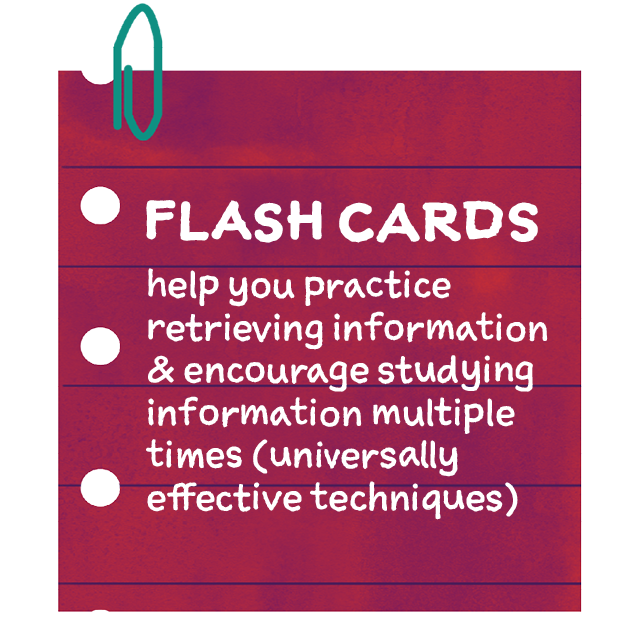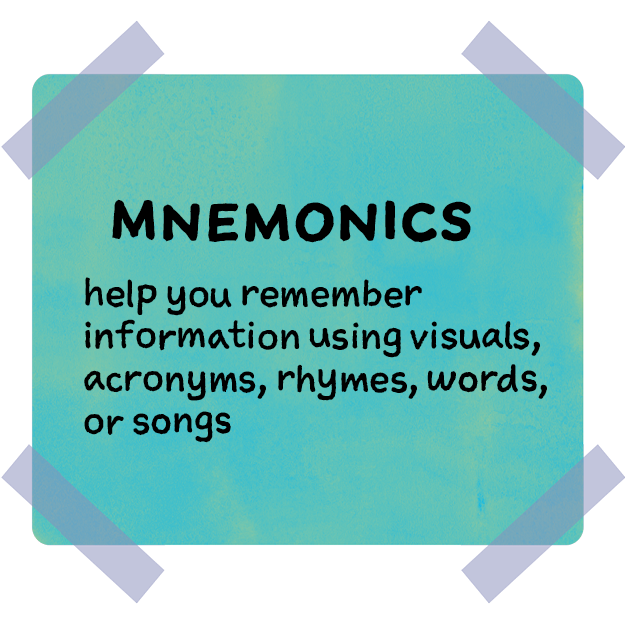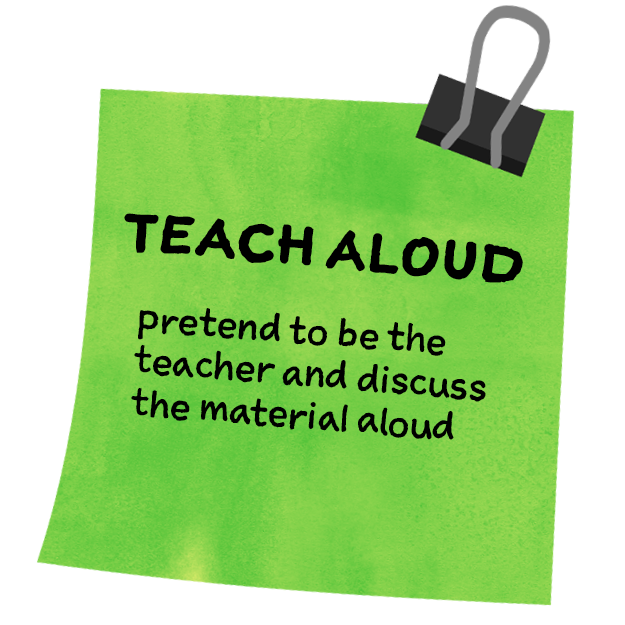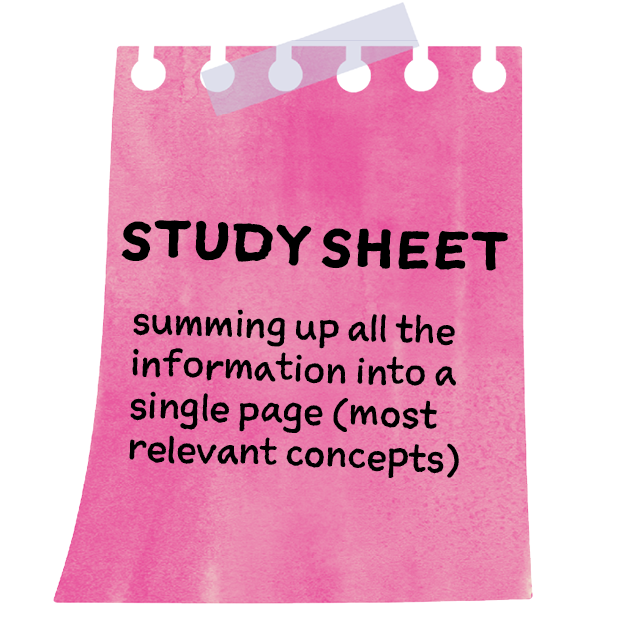
Key points
- Studies show that visual representations, mnemonics, handwritten notes, and association techniques can help us remember more information when studying.
- Everyone is different, so you may need to test out a few study techniques to find what works best for you.
Exam season is one of the most stressful parts of student life. Studying for multiple exams within the same week and trying to juggle your social life or family responsibilities, all the while staying fed and showered, can be super challenging.
If you find yourself getting distracted, science-backed strategies can help you study effectively and “work smarter, not harder.” Remember that everybody is different, so what works for your friend or a classmate might not work for you. It’s best to start studying well before an exam so you can try a few techniques to find what works best for you.
Remember that every strategy for getting good grades should include getting enough sleep, eating well, and taking mental health breaks. Happy studies!
Concept map
Helpful for:
- Multiple-choice exams
- Essay exams
- Memorizing written material
- Understanding concepts
Flash cards
Helpful for:
- Multiple-choice exams
- Memorizing written material
- Specific dates or definitions
Recall with association
Helpful for:
- Memorizing written material
- Complex or abstract concepts
Teach the material aloud
Helpful for:
- Oral examination
- Complex or abstract concepts
Study sheet
Helpful for:
- Multiple-choice
- Memorizing written material
- Complex or abstract concepts
 Helpful for: multiple-choice exams, essay exams, memorizing written material, understanding concepts
Helpful for: multiple-choice exams, essay exams, memorizing written material, understanding concepts
Use a visual representation of information—like a chart, table, Venn diagram, timeline, or flowchart—to understand and remember key points. Concept maps help illustrate the relationship between different concepts and ideas. It sounds complicated, but it’s pretty simple—see this example of a concept map related to trees.
- To draw a concept map, pick a concept your professor has often discussed in class.
- Then, organize your chart by linking as many ideas as you remember to your chosen concept.
- Finally, read through your notes and other class material to add any relevant information you might have forgotten.

Helpful for: multiple-choice exams, memorizing written material (especially specific dates or definitions)
Flash cards help you practice retrieving information and encourage studying information multiple times, both of which “are universally effective techniques” for memorizing things like facts, definitions, and dates, says Toshima Miyatsu, a research scientist at the Institute for Human and Machine Cognition in Pensacola, Florida.
Flash cards are also great because you can carry them with you or use an electronic version to study on the go.
- Use small note cards and write a keyword or a short question on one side and the definition or answer on the other.
- Look at only the “question” side and try to retrieve the answer without looking at the back (but, of course, the answer is there for easy reference if needed).
- Repeat as often as possible! Even just a few minutes while waiting for your bus can be enough to fit in some flash card review.
To make the best use of flash cards, try prepping them as you learn material throughout the term.
“Set aside 30 minutes towards the end of the day, and first try to remember as much information from the class you took that day,” says Miyatsu. “Then, review the materials to see what you retrieved correctly and what you missed. Reviewing information even just once this way will strengthen the memory substantially and provide a strong basis to prepare for an exam later.”

Helpful for: memorizing written material, studying complex or abstract concepts
Mnemonics are tools or techniques that help you remember information, often using visuals, acronyms, rhymes, words, or songs. If you’re creative or musical, recall with association might be perfect for you. Some research studies confirm the benefit of recall with association and show that it can make learning easier.
Acronyms: Try using an odd yet memorable phrase to remember concepts that would otherwise require way more memory effort. A classic example of this would be using the sentence My very eager mother just served us nine pizzas to remember the eight planets in order (plus the dwarf planet, Pluto): Mercury, Venus, Earth, Mars, Jupiter, Saturn, Uranus, Neptune, and Pluto.
Association: This involves making a memorable association to help you remember something. For instance, if you’re trying to remember the name “Neil,” imagine a person kneeling to pick up something.
Chunking: If you need to remember something lengthy, try breaking it down into smaller pieces with “chunking.” For instance, if you’re having trouble memorizing a date, break it into double digits (so if you’re trying to remember July 4, 1776, try remembering 7-4-17-76).
Method of loci: If you’re trying to remember a list of things, it can help to mentally assign different items to represent each one on the list and visualize placing them in a familiar room. In your mind, pick one “area” of your room for each item. Then, imagine yourself touring the room and picking up each item.
Songs and rhymes: If you’re into music, this one might be for you. Find a sentence or list of information you need to recall and try to set it to the tune of your favorite song (or any catchy song that fits). Sing it a few times to make it stick!
 Helpful for: oral examination, studying complex or abstract concepts
Helpful for: oral examination, studying complex or abstract concepts
This is a simple but effective method to practice information retrieval and make concepts stick in your mind before an exam or oral presentation.
- Pretend to be the teacher and discuss the material aloud as if you were giving the class.
- Whenever you get stuck on a topic or don’t feel confident in what you’re “teaching,” make a note of it.
- Read up on it later, jot down a couple of notes, and try to give a lesson out loud again.
- If you’ve got a study buddy, get them to ask questions to challenge your learning and see how thorough your responses are.
 Helpful for: multiple-choice, memorizing written material, studying complex or abstract concepts
Helpful for: multiple-choice, memorizing written material, studying complex or abstract concepts
Summing up all the information into a single page forces you to think about what the most relevant concepts and ideas are. This is beneficial because students who practice summarizing notes tend to have better grades than those who don’t. Some professors even allow a single summary sheet during the exam—if that’s the case, definitely take them up on it.
- Sum up all your study material for the course on one sheet. To make the most out of your cheat sheet, make sure it’s handwritten. The science is clear: Handwriting is better for memory retention than typing.
- Look over it frequently. Focus on one section at a time or highlight key information to remember.
“I budget my study time like I do with money. In my graduate program, I don’t have exams, but it’s a lot of reading and writing, so I try to spend my time wisely. I now have a good sense of how long it will take me to do tasks.”
—Kaib L., second-year graduate student, University of Colorado Denver
“[I use] repetition and handwritten notes. I also like to bring concepts into real-world examples for me to remember their application.”
—Trisha M., second-year graduate student, Clemson University, South Carolina
“I use flash cards if I am asked to memorize things, and I reread notes and watch videos if I am asked to understand a concept in detail. I also use study guides, if given, to make sure I know what I am asked to know for the exam. These all work because they all make me repeat and rework problems to understand them better.”
—Erin F., first-year graduate student, University of Wyoming, Laramie
You need good sleep for optimal cognitive performance—and that means on a regular basis, not just the night before the big exam.
“For those who have trouble studying and focusing, I recommend optimizing sleep,” says Miyatsu. “First, as many of you know, good sleep leads to better focus and motivation. Lesser known is the fact that good sleep after learning is crucial to ‘make the memory stick.’ While asleep, your brain engages in consolidation, where neurons ‘replay’ what we learned that day, resulting in strengthening of the learned information.”
Foods linked to better brain health: Harvard Health Publishing
How to study effectively: Oxford Learning
Article sources
Toshima Miyatsu, research scientist, Institute for Human and Machine Cognition, Pensacola, Florida.
CampusWell survey, July 2022.
Chiu, C.-H., Wu, C.-Y., & Cheng, H.-W. (2013). Integrating reviewing strategies into shared electronic note-taking: Questioning, summarizing and note reading. Computers & Education, 67, 229–238. https://doi.org/10.1016/j.compedu.2013.04.015
Cromwelle, J. (2022, April 26). 25 scientifically proven tips for more effective studying. MyDegree Guide. https://www.mydegreeguide.com/how-to-study-tips/
Dobson, J. L., Perez, J., & Linderholm, T. (2016). Distributed retrieval practice promotes superior recall of anatomy information. Anatomical Sciences Education, 10(4), 339–347. https://doi.org/10.1002/ase.1668
How to take an oral exam. (n.d.). Hamilton College. https://www.hamilton.edu/academics/centers/oralcommunication/guides/how-to-take-an-oral-exam
Kwantlen Polytechnic University. (n.d.). Spaced repetition: Remembering what you learn. https://www.kpu.ca/sites/default/files/Learning%20Centres/Think_SpacedRepetition_LA.pdf
Matthews, W. A. (1973). Association and categorisation effects on free recall. Acta Psychologica, 37(1), 65–77. https://doi.org/10.1016/0001-6918(73)90034-6
Putnam, A. L. (2015). Mnemonics in education: Current research and applications. Translational Issues in Psychological Science, 1(2), 130–139. https://psycnet.apa.org/doi/10.1037/tps0000023
Umejima, K., Ibaraki, T., Yamazaki, T., & Sakai, K. L. (2021). Paper notebooks vs. mobile devices: Brain activation differences during memory retrieval. Frontiers in Behavioral Neuroscience, 15. https://doi.org/10.3389/fnbeh.2021.634158
University of North Carolina at Chapel Hill. (n.d.). Concept maps. The Learning Center. https://learningcenter.unc.edu/tips-and-tools/using-concept-maps/
University of North Carolina at Chapel Hill. (n.d.). Studying 101: Study smarter not harder. The Learning Center. https://learningcenter.unc.edu/tips-and-tools/studying-101-study-smarter-not-harder/
University of Southern Maine. (n.d.). Academic gains through improved learning effectiveness (AGILE): Using flashcards. https://usm.maine.edu/agile/using-flashcards
University of Wisconsin Eau Claire. (n.d.). Taking multiple choice exams. https://people.uwec.edu/ivogeler/multiple.htm



































